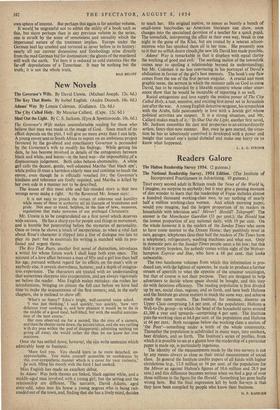New Novels .
The City Called Holy. By Maurice Callard. (Cape. 12s. 6d.) Shut Out the Light. By C. S. Jackson. (Eyre & Spottiswoode. 10s. 6d.) The Governor's Wife makes uncomfortable reading for those who believe that man was made in the image of God. Since much of its effect depends on the plot, I will give no more away than I can help. A young envoy sent to South Africa to report on an ambitious project favoured by the go-ahead and conciliatory Governor is persuaded by the Governor's wife to modify his findings. While getting his data, he has become involved in details of the antagonism between black and white, and learns—in the hard way—the impossibility„of a dispassionate judgement. Both sides behave. abominably. A white girl calls the decent, gentle, well educated Martha 'that black ape'; white police ill-treat a harmless elderly man and continue to insult the envoy, even though he is officially vouched for; the Governor's kindness and tolerance are foully requited, and Martha is killed by her own side in a manner not to be described.
The lesson of this most able and fair-minded story is that two wrongs never make a right. As the Reverend Mr. Jensen says:
It is not easy to preach the virtues of tolerance and humility while many of those in authority set an example of brutishness and pride. Not easy to stand, helpless, in the face of laws, measures, regulations that make nonsense of our professed Christianity.
Mr. Unwin is to be congratulated on a first novel which deserves wide success. He has a sharp eye•for people and things in movement, and is humble but penetrating before the mysteries of personality. Once or twice he shows a touch of inexperience, as when a vital fact about Rose's character is slipped into a line of dialogue too late to play its part: but in essentials his writing is matched with its pro- found and urgent theme.
The Key That Rusts, another first novel of distinction, introduces a writer for whose future work I shall keep both eyes open; The account of a love affair between a man of fifty and a girl less than half his age, pursued without regard for its effects on the man's wife or anybody else, it reveals shrewdness, humour, and a depth of imagina- tive experience. The characters are treated with an understanding that sometimes sharpens into exasperation, and are always vigorously set before the reader. Miss English makes mistakes : she rushes her introductions, bringing on almost the full cast before we have had time 'to make the acquaintance of the first corners; and, in the early chapters, she is inclined to show off: 'What's so funny?' Edna's bright, well-corseted voice asked.
'I was just thinking,' I said quickly, too quickly, 'how very delicious your cooking is, and how pleasant it would be to die in the middle of a good meal, half-filled, but with the soulful anticipa- tion of the next course.'
Her eyes observed me for a second, like the eyes of a camera, and then the shutter came down, the picture taken, and she was rattling with dry peas within the pod of disapproval; admitting nothing yet giving all away, she would rather die than let me know her true reactions.
Once she has settled down, however, she can write sentences which admirably keep to business: More fool you. You should learn to be more detached, un- approachable. You make yourself accessible to confidences by this over-sympathetic manner which is a cover for your curiosity,' tie said, filling his mouth with the food I had cooked.
Miss English has made an excellent debut.
In Adams' Way both themes are linked, black against white, and a middle-aged man involved with a young girl; but the setting and the relationship are different. The narrator, David Adams, aged sixty-odd, takes into his house a young negress who is being rail- roaded out of the town, and, finding that she has a lively mind, decides to teach her. His original motive, to annoy as beastly a bunch of small-town busybodies as American literature can show, soon changes into the specialised devotion of a teacher for a quick pupil. The townsfolk, interpreting the affair in their own way, break in one night in the guise of the Klan, but are routed by a veteran school- mistress who has spanked them all in her time. She presently sees to it that no selfish desire cloudsjhe new life David has made possible.
Adams' Way is remarkable in that it displays with equal clarity the working of good and evil. The seething malice of the townsfolk comes near to spoiling a relationship beyond its understanding; but Mr. Coleman is no less convincing in his portrayal of David's abdication in favour of the girl's best interests. The book's one flaw comes from the use of the first person singular. A crucial and most graphic scene, the sermon in which the minister calls on God to curse David, has to be recorded by a likeable eccentric whose other utter- ances show that he would be incapable of reporting it so well.
Racial antagonism and love supply the motive power of The City Called Holy, a taut, sensitive, and exciting first novel set in Jerusalem just after the war. A young English detective-sergeant, his sympathies with the Arabs, falls passionately in love with a Jewish girl whose political activities are suspect. It is a strong situation, and Mr. Callard makes much of it. In Shut Out the Light, another first novel, Mr. Jackson assembles his cast and properties in an extraordinarily artless, fancy-that-now manner. But, once he gets started, the situa- tion he has so laboriously contrived is developed with a power and insight that cancel one's initial disbelief and make one hurry on to know what happened.
L. A. G. STRONG


































 Previous page
Previous page